Are you a registered nurse looking to take the next step in your nursing career? You might consider getting your Master of Science in Nursing and becoming a Family Nurse Practitioner!
What exactly is a Family Nurse Practitioner (FNP) and what do they do? An FNP is an advanced practice registered nurse (APRN) who manages the healthcare of individuals and their families. FNPs provide preventive and primary care, promote health and well-being, and help their patients manage chronic conditions. FNPs conduct routine checkups and assessments, order and interpret tests, make diagnoses, prescribe medications, and initiate and manage treatment plans for their patients.FNPs can practice in various settings, including hospital outpatient clinics, community health centers, private group practices, universities, and single provider private practices. According to salary.com, FNPs in the United States make on average between $108,460 and $126,980 a year, but range widely depending on years of experience, certifications, and geographic location.
Are you considering becoming a Family Nurse Practitioner? We have outlined the process in five steps.

1. Become a Registered Nurse (RN) and get your Bachelor of Science in Nursing (BSN)
If you have not received your BSN yet, we encourage you to look into one of the many one-year BSN programs. You will also need one year of experience as a registered nurse to apply for many advanced nursing programs such as those offered at Frontier Nursing University.
2. Search For and Apply To an Accredited FNP Program
Once you are an RN with a BSN, you can apply to an FNP program! You want to apply to an accredited FNP program, as these programs meet rigorous accreditation standards. Frontier Nursing University’s programs are highly accredited, and our FNP program is accredited by the Accreditation Commission for Education in Nursing (ACEN).
FNU offers an online graduate Family Nurse Practitioner specialty track that can be pursued full- or part-time while completing a Master of Science in Nursing (MSN) or a Post-Graduate Certificate (PGC). After earning an MSN or certificate, you have the option to continue on to the Doctor of Nursing Practice program at FNU.
While searching for a university that offers an FNP program, you also want to review their test scores. Look for a university whose graduates have high pass rates for certification exams. In 2021 FNU had an overall certification pass rate of 97% (Source: AANP).
Another thing to consider and research is tuition rates for Family Nurse Practitioner programs. Frontier Nursing University offers affordable tuition rates for our online FNP program.
3. I’ve Been Accepted; Now What?
Congratulations! You’ve been accepted into an FNP program! At Frontier Nursing University, our FNP students typically take between 2-3 years to complete their advanced degree online. The full-time program of study is eight-week terms, while the part-time program of study is 10-week terms. FNU students complete online didactic coursework and clinical experiences in their own community with two brief campus immersion experiences on our Versailles, Kentucky, campus during their time at FNU. The first visit is a three-day orientation called Frontier Bound.
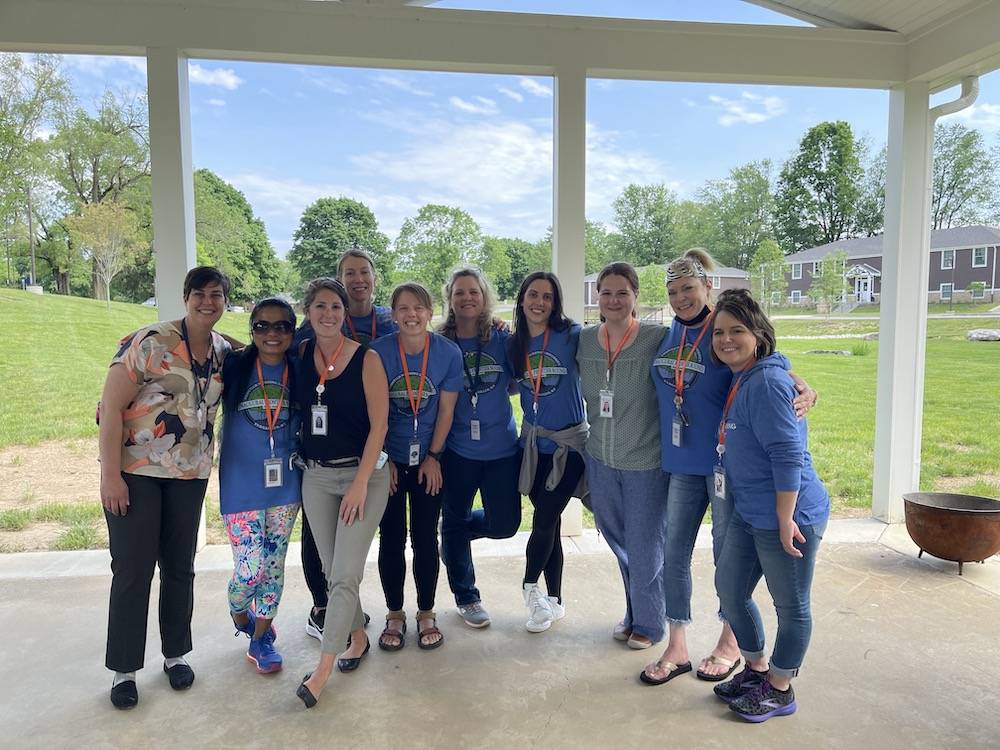
4. Prepare for Your Clinical Experience
At Frontier Nursing University, you are not alone in your search for clinical site placement. We are with you every step of the way. FNU offers clinical outreach and placement services and resources for FNP students to assist them in identifying potential clinical sites. Our clinical outreach and placement team provides support to help you navigate the overall clinical site search process.
Once students complete online didactic studies at FNU, they return to the Versailles, Kentucky, campus for Clinical Bound. Clinical Bound is a five-day skills-intensive experience to prepare students for their clinical practicum. This unique, hands-on active learning experience allows students to feel validated as having acquired the skills necessary to begin their community-based clinical practicum. Clinical Bound allows students to communicate face-to-face with faculty members and peers, often making lifelong friends along the way.
Upon completion of Clinical Bound, FNP students begin their clinical practicum! The clinical experience is one of the most exciting times in an FNP student’s journey as it allows you to gain hands-on experience with practicing clinicians in your community.
FNU Family Nurse Practitioner students typically take 4-6 months to complete the clinical practicum in or close to their home community. Each student’s clinical practicum is carefully designed to meet individual student needs. Students complete clinical rotations focusing on pediatrics, adult primary care, women’s health, and geriatrics.
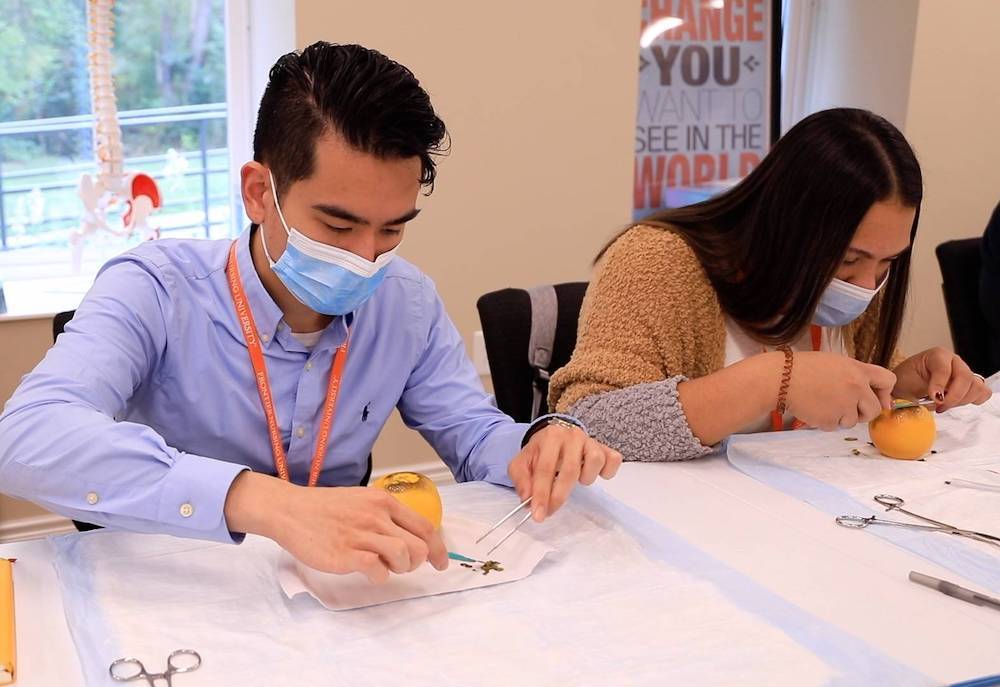
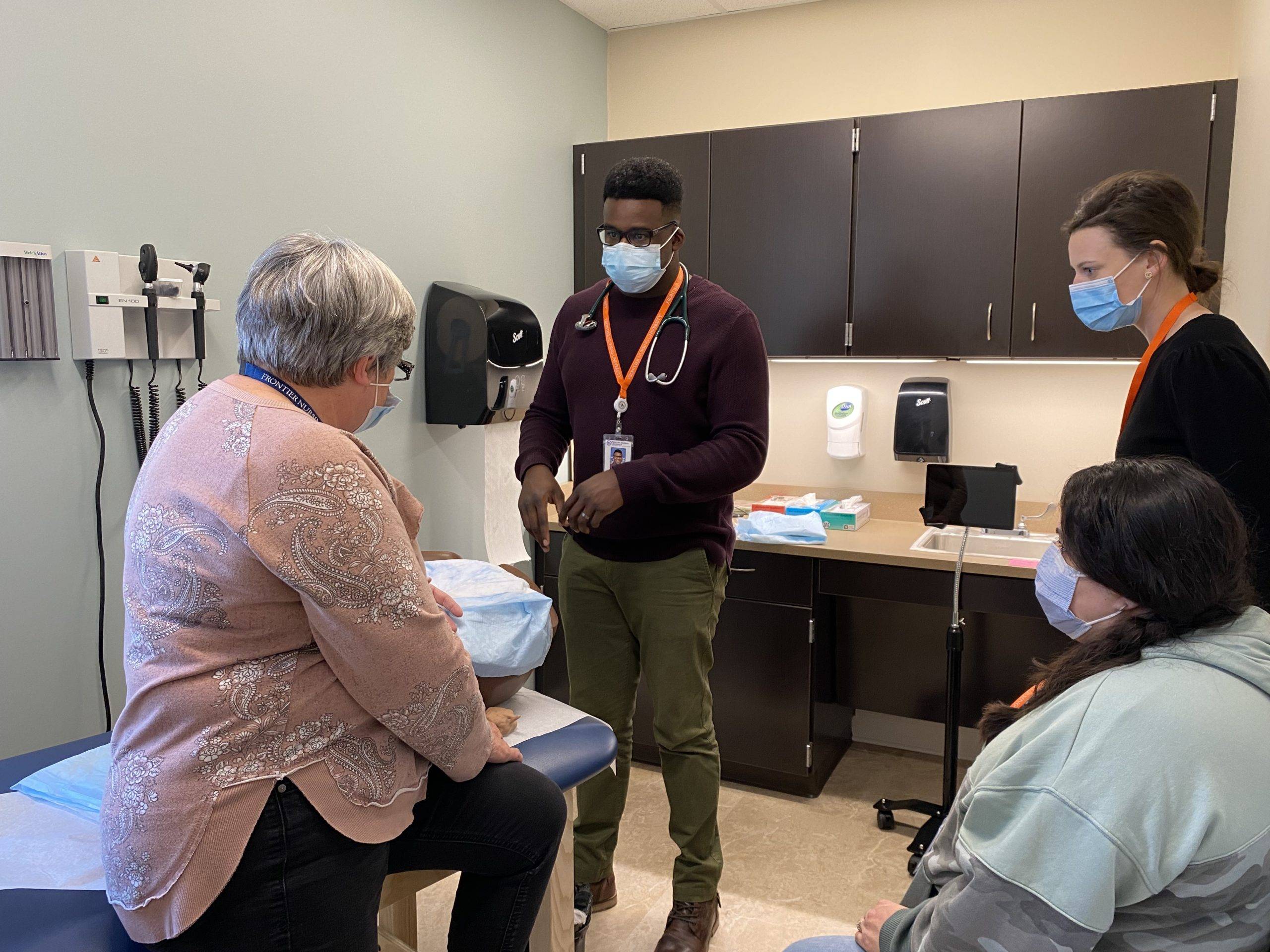
5. Sit for Your Certification Exam!
Once you have completed your course and clinical practicum work, now it is time to sit for your certification exam! Family Nurse Practitioners sit for national certifications through the American Nurses Credentialing Center (ANCC) or the American Association of Nurse Practitioners (AANP). FNU students are well-prepared for these examinations. As mentioned previously, in 2021, FNU FNP graduates had an overall AANP certification pass rate of 97% and ANCC certification pass rate of 100%.
Begin Your Career as an FNP
Once you pass your boards, you can officially practice as a Family Nurse Practitioner. As an FNP, you are prepared to provide a wide range of family-focused health care services to patients of all ages, including infants, adolescents, adults, and seniors (source: https://www.aanp.org/news-feed/are-you-considering-a-career-as-a-family-nurse-practitioner).
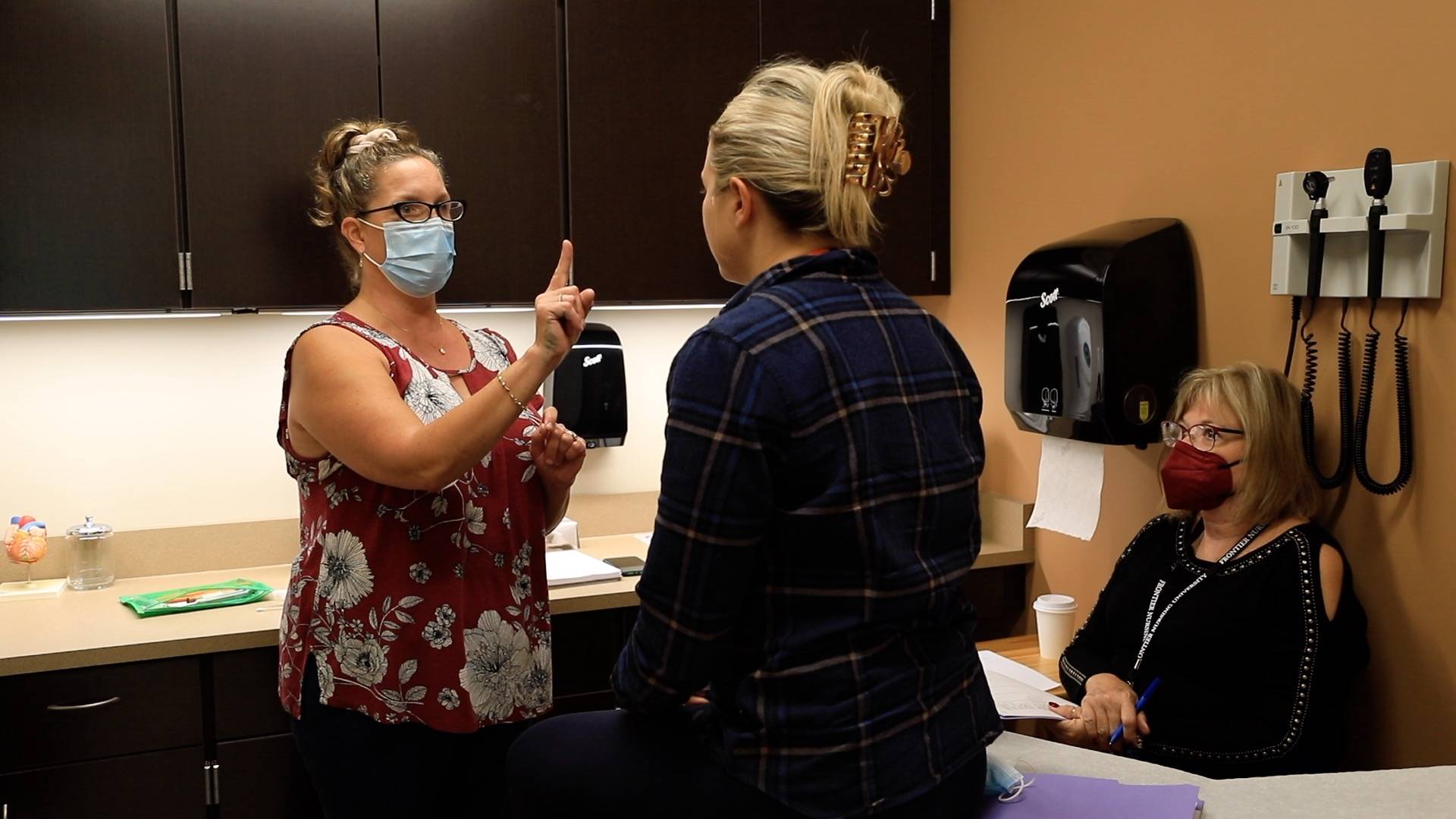
Although FNPs have a broad scope of practice, including providing preventive and primary care, promoting health and wellbeing, and helping patients manage chronic conditions. FNPs can also obtain additional certifications. These certifications can include diabetes, pain management, or obesity management. You can also return to a university for a post-graduate certificate (PGC) or for your Doctor of Nursing Practice. FNU offers PGCs in nurse-midwifery, psychiatric-mental health, and women’s health care.
As an FNP, you should remain active in national organizations like the American Association of Nurse Practitioners. AANP offers conferences, continuing education resources, a community of like-minded individuals, and more!
You can also give back to your profession after you graduate and become a preceptor!
Why become a preceptor?
- Promote your profession through the education and guidance of your future peers
- Help expand access to quality, compassionate care to diverse, rural and underserved populations
- Earn an honorarium based on the percentage of time spent precepting students
- Gain access to FREE CEUs including sessions on pharmacology and other current topics
Are you ready to start your journey as a Family Nurse Practitioner? Request more information about FNU’s online FNP program today!
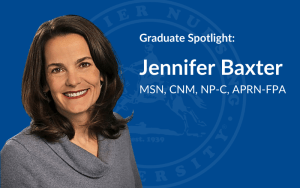





















 Carrie Belin is an experienced board-certified Family Nurse Practitioner and a graduate of the Johns Hopkins DNP program, Johns Hopkins Bloomberg School of Public Health, Georgetown University School of Nursing, and Johns Hopkins School of Nursing. She has also completed fellowships at Georgetown and the University of California Irvine.
Carrie Belin is an experienced board-certified Family Nurse Practitioner and a graduate of the Johns Hopkins DNP program, Johns Hopkins Bloomberg School of Public Health, Georgetown University School of Nursing, and Johns Hopkins School of Nursing. She has also completed fellowships at Georgetown and the University of California Irvine. Angie has been a full-scope midwife since 2009. She has experience in various birth settings including home, hospital, and birth centers. She is committed to integrating the midwifery model of care in the US. She completed her master’s degree in nurse-midwifery at Frontier Nursing University (FNU) and her Doctorate at Johns Hopkins University. She currently serves as the midwifery clinical faculty at FNU. Angie is motivated by the desire to improve the quality of healthcare and has led quality improvement projects on skin-to-skin implementation, labor induction, and improving transfer of care practices between hospital and community midwives. In 2017, she created a short film on skin-to-skin called
Angie has been a full-scope midwife since 2009. She has experience in various birth settings including home, hospital, and birth centers. She is committed to integrating the midwifery model of care in the US. She completed her master’s degree in nurse-midwifery at Frontier Nursing University (FNU) and her Doctorate at Johns Hopkins University. She currently serves as the midwifery clinical faculty at FNU. Angie is motivated by the desire to improve the quality of healthcare and has led quality improvement projects on skin-to-skin implementation, labor induction, and improving transfer of care practices between hospital and community midwives. In 2017, she created a short film on skin-to-skin called 










 Justin C. Daily, BSN, RN, has ten years of experience in nursing. At the start of his nursing career, Justin worked as a floor nurse on the oncology floor at St. Francis. He then spent two years as the Director of Nursing in a small rural Kansas hospital before returning to St. Francis and the oncology unit. He has been in his current position as the Chemo Nurse Educator for the past four years. He earned an Associate in Nurse from Hutchinson Community College and a Bachelor of Science in Nursing from Bethel College.
Justin C. Daily, BSN, RN, has ten years of experience in nursing. At the start of his nursing career, Justin worked as a floor nurse on the oncology floor at St. Francis. He then spent two years as the Director of Nursing in a small rural Kansas hospital before returning to St. Francis and the oncology unit. He has been in his current position as the Chemo Nurse Educator for the past four years. He earned an Associate in Nurse from Hutchinson Community College and a Bachelor of Science in Nursing from Bethel College. Brandy Jackson serves as the Director of Undergraduate Nursing Programs and Assistant Educator at Wichita State University and Co-Director of Access in Nursing. Brandy is a seasoned educator with over 15 years of experience. Before entering academia, Brandy served in Hospital-based leadership and Critical Care Staff nurse roles. Brandy is passionate about equity in nursing education with a focus on individuals with disabilities. Her current research interests include accommodations of nursing students with disabilities in clinical learning environments and breaking down barriers for historically unrepresented individuals to enter the nursing profession. Brandy is also actively engaged in Interprofessional Education development, creating IPE opportunities for faculty and students at Wichita State. Brandy is an active member of Wichita Women for Good and Soroptimist, with the goal to empower women and girls. Brandy is a TeamSTEPPS master trainer. She received the DASIY Award for Extraordinary Nursing Faculty in 2019 at Wichita State University.
Brandy Jackson serves as the Director of Undergraduate Nursing Programs and Assistant Educator at Wichita State University and Co-Director of Access in Nursing. Brandy is a seasoned educator with over 15 years of experience. Before entering academia, Brandy served in Hospital-based leadership and Critical Care Staff nurse roles. Brandy is passionate about equity in nursing education with a focus on individuals with disabilities. Her current research interests include accommodations of nursing students with disabilities in clinical learning environments and breaking down barriers for historically unrepresented individuals to enter the nursing profession. Brandy is also actively engaged in Interprofessional Education development, creating IPE opportunities for faculty and students at Wichita State. Brandy is an active member of Wichita Women for Good and Soroptimist, with the goal to empower women and girls. Brandy is a TeamSTEPPS master trainer. She received the DASIY Award for Extraordinary Nursing Faculty in 2019 at Wichita State University.  Dr. Sabrina Ali Jamal-Eddine is an Arab-disabled queer woman of color with a PhD in Nursing and an interdisciplinary certificate in Disability Ethics from the University of Illinois Chicago (UIC). Dr. Jamal-Eddine’s doctoral research explored spoken word poetry as a form of critical narrative pedagogy to educate nursing students about disability, ableism, and disability justice. Dr. Jamal-Eddine now serves as a Postdoctoral Research Associate in UIC’s Department of Disability and Human Development and serves on the Board of Directors of the National Organization of Nurses with Disabilities (NOND). During her doctoral program, Sabrina served as a Summer Fellow at a residential National Endowment of the Humanities (NEH) Summer Institute at Arizona State University (2023), a summer fellow at Andrew W. Mellon’s National Humanities Without Walls program at University of Michigan (2022), a Summer Research Fellow at UC Berkeley’s Othering & Belonging Institute (2021), and an Illinois Leadership Education in Neurodevelopmental and related Disabilities (LEND) trainee (2019-2020).
Dr. Sabrina Ali Jamal-Eddine is an Arab-disabled queer woman of color with a PhD in Nursing and an interdisciplinary certificate in Disability Ethics from the University of Illinois Chicago (UIC). Dr. Jamal-Eddine’s doctoral research explored spoken word poetry as a form of critical narrative pedagogy to educate nursing students about disability, ableism, and disability justice. Dr. Jamal-Eddine now serves as a Postdoctoral Research Associate in UIC’s Department of Disability and Human Development and serves on the Board of Directors of the National Organization of Nurses with Disabilities (NOND). During her doctoral program, Sabrina served as a Summer Fellow at a residential National Endowment of the Humanities (NEH) Summer Institute at Arizona State University (2023), a summer fellow at Andrew W. Mellon’s National Humanities Without Walls program at University of Michigan (2022), a Summer Research Fellow at UC Berkeley’s Othering & Belonging Institute (2021), and an Illinois Leadership Education in Neurodevelopmental and related Disabilities (LEND) trainee (2019-2020). Vanessa Cameron works for Vanderbilt University Medical Center in Nursing Education & Professional Development. She is also attending George Washington University and progressing towards a PhD in Nursing with an emphasis on ableism in nursing. After becoming disabled in April 2021, Vanessa’s worldview and perspective changed, and a recognition of the ableism present within healthcare and within the culture of nursing was apparent. She has been working since that time to provide educational foundations for nurses about disability and ableism, provide support for fellow disabled nursing colleagues, and advocate for the disabled community within healthcare settings to reduce disparities.
Vanessa Cameron works for Vanderbilt University Medical Center in Nursing Education & Professional Development. She is also attending George Washington University and progressing towards a PhD in Nursing with an emphasis on ableism in nursing. After becoming disabled in April 2021, Vanessa’s worldview and perspective changed, and a recognition of the ableism present within healthcare and within the culture of nursing was apparent. She has been working since that time to provide educational foundations for nurses about disability and ableism, provide support for fellow disabled nursing colleagues, and advocate for the disabled community within healthcare settings to reduce disparities. Dr. Lucinda Canty is a certified nurse-midwife, Associate Professor of Nursing, and Director of the Seedworks Health Equity in Nursing Program at the University of Massachusetts Amherst. She earned a bachelor’s degree in nursing from Columbia University, a master’s degree from Yale University, specializing in nurse-midwifery, and a PhD from the University of Connecticut. Dr. Canty has provided reproductive health care for over 29 years. Her research interests include the prevention of maternal mortality and severe maternal morbidity, reducing racial and ethnic health disparities in reproductive health, promoting diversity in nursing, and eliminating racism in nursing and midwifery.
Dr. Lucinda Canty is a certified nurse-midwife, Associate Professor of Nursing, and Director of the Seedworks Health Equity in Nursing Program at the University of Massachusetts Amherst. She earned a bachelor’s degree in nursing from Columbia University, a master’s degree from Yale University, specializing in nurse-midwifery, and a PhD from the University of Connecticut. Dr. Canty has provided reproductive health care for over 29 years. Her research interests include the prevention of maternal mortality and severe maternal morbidity, reducing racial and ethnic health disparities in reproductive health, promoting diversity in nursing, and eliminating racism in nursing and midwifery. Dr. Lisa Meeks is a distinguished scholar and leader whose unwavering commitment to inclusivity and excellence has significantly influenced the landscape of health professions education and accessibility. She is the founder and executive director of the DocsWithDisabilities Initiative and holds appointments as an Associate Professor in the Departments of Learning Health Sciences and Family Medicine at the University of Michigan.
Dr. Lisa Meeks is a distinguished scholar and leader whose unwavering commitment to inclusivity and excellence has significantly influenced the landscape of health professions education and accessibility. She is the founder and executive director of the DocsWithDisabilities Initiative and holds appointments as an Associate Professor in the Departments of Learning Health Sciences and Family Medicine at the University of Michigan. Dr. Nikia Grayson, DNP, MSN, MPH, MA, CNM, FNP-C, FACNM (she/her) is a trailblazing force in reproductive justice, blending her expertise as a public health activist, anthropologist, and family nurse-midwife to champion the rights and health of underserved communities. Graduating with distinction from Howard University, Nikia holds a bachelor’s degree in communications and a master’s degree in public health. Her academic journey also led her to the University of Memphis, where she earned a master’s in medical anthropology, and the University of Tennessee, where she achieved both a master’s in nursing and a doctorate in nursing practice. Complementing her extensive education, she completed a post-master’s certificate in midwifery at Frontier Nursing University.
Dr. Nikia Grayson, DNP, MSN, MPH, MA, CNM, FNP-C, FACNM (she/her) is a trailblazing force in reproductive justice, blending her expertise as a public health activist, anthropologist, and family nurse-midwife to champion the rights and health of underserved communities. Graduating with distinction from Howard University, Nikia holds a bachelor’s degree in communications and a master’s degree in public health. Her academic journey also led her to the University of Memphis, where she earned a master’s in medical anthropology, and the University of Tennessee, where she achieved both a master’s in nursing and a doctorate in nursing practice. Complementing her extensive education, she completed a post-master’s certificate in midwifery at Frontier Nursing University.









 Dr. Tia Brown McNair is the Vice President in the Office of Diversity, Equity, and Student Success and Executive Director for the Truth, Racial Healing, and Transformation (TRHT) Campus Centers at the American Association of Colleges and Universities (AAC&U) in Washington, DC. She oversees both funded projects and AAC&U’s continuing programs on equity, inclusive excellence, high-impact practices, and student success. McNair directs AAC&U’s Summer Institutes on High-Impact Practices and Student Success, and TRHT Campus Centers and serves as the project director for several AAC&U initiatives, including the development of a TRHT-focused campus climate toolkit. She is the lead author of From Equity Talk to Equity Walk: Expanding Practitioner Knowledge for Racial Justice in Higher Education (January 2020) and Becoming a Student-Ready College: A New Culture of Leadership for Student Success (July 2016 and August 2022 Second edition).
Dr. Tia Brown McNair is the Vice President in the Office of Diversity, Equity, and Student Success and Executive Director for the Truth, Racial Healing, and Transformation (TRHT) Campus Centers at the American Association of Colleges and Universities (AAC&U) in Washington, DC. She oversees both funded projects and AAC&U’s continuing programs on equity, inclusive excellence, high-impact practices, and student success. McNair directs AAC&U’s Summer Institutes on High-Impact Practices and Student Success, and TRHT Campus Centers and serves as the project director for several AAC&U initiatives, including the development of a TRHT-focused campus climate toolkit. She is the lead author of From Equity Talk to Equity Walk: Expanding Practitioner Knowledge for Racial Justice in Higher Education (January 2020) and Becoming a Student-Ready College: A New Culture of Leadership for Student Success (July 2016 and August 2022 Second edition).